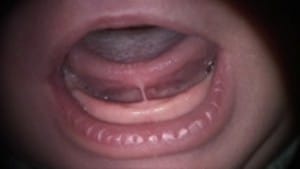
Many mothers who are nursing can have issues where the child nursing sometimes falls off the breast and has trouble staying latched while nursing. While this could just mean that the mother needs more practice nursing the child and breastfeeding, as she could be a first time mother, it could also mean that the child has tongue tie, or lips. Tongue tie can lead to speech impediments and other conditions later in life if not treated early on.
What is a Tongue Tie?
Tongue tie, also known as ankyloglossia, is when the tissue that connects the tongue to the bottom portion of the mouth is too short. This can restrict range of motion for the tongue and can prohibit it from moving at all.Breastfeeding can be difficult to do if a child is born with tongue tie, as this condition often develops while the child is still in the womb of the mother. This condition is rare and typically occurs more often in boys. This condition can create both immediate and long-term problems in infants, children, and adults, and tends to run in the family as a hereditary issue.
Symptoms of Tongue and Lip Tie

If you’re trying to figure out whether or not your child or newborn has tongue or lip tie, here are some symptoms that can indicate if they are affected.If you notice your child having any difficulty at all moving their tongue towards the upper part of their mouth, moving their tongue from side to side, or pushing their tongue around their lower teeth, it is possible that your child has tongue tie.
How Can a Frenectomy Help?
In infants, a severely tethered lip or tongue can impede nursing efforts. This can cause a shallow or painful latch, which increases the risk of plugged ducts or mastitis, and can lead to swallowing of more air when breastfeeding. These babies are often gassy, may spit up more often, and may be diagnosed with reflux. Besides causing problems with nursing or bottle feeding, if left untreated, severely “tied” lips can increase the risk of cavities on front teeth, and in some cases can cause spacing between the top front two teeth. A severely “tied” tongue may lead to speech problems, and also leads to increased mouth breathing due to incorrect tongue posture and in some cases sleep apnea.
A Frenectomy is important because it can stop any potential complications and conditions down the road for your child if caught early. During a frenectomy, a small cut is made to the small sliver of tissue connecting the tongue and bottom portion of the mouth. This helps the tongue have more range of motion and move with less restriction. This procedure can be done without the use of anesthesia, and is often better to be done the younger a child is. This will help increase recovery time.
Dr. Jensen’s Solution
In children and adults, high attachments of tissue can pull on the gums, leading to recession and may require surgical gum grafts as being the only option to repair the damage. Our doctors evaluate lip ties and tongue ties,as well as tethered oral tissue for severity and function problems, and can revise this tissue quickly in the office without the need for general anesthesia using our lasers. Dr. Jensen has been providing this service for infants in the area since 2013. Dr. Jensen is also currently a member of the International Affiliation of Tongue-Tie Professionals.
Give Us a Call Today!
At Broadway Family Dentistry located in Minot, ND, we are dedicated to helping patients understand their dental health and that it is important to us. With state-of-the-art technology and equipment, we provide nothing but the best dental care and service for you and your family. Our goal is to help you reach your dental health goals and to reach a healthier and happier you!
For more information about frenectomy for tongue ties in Minot, Williston, Garrison, New Town, Rugby, Bismark or Devils Lake, ND, give Broadway Family Dentistry a call at 701-839-1299 or fill out a Contact Form here.

